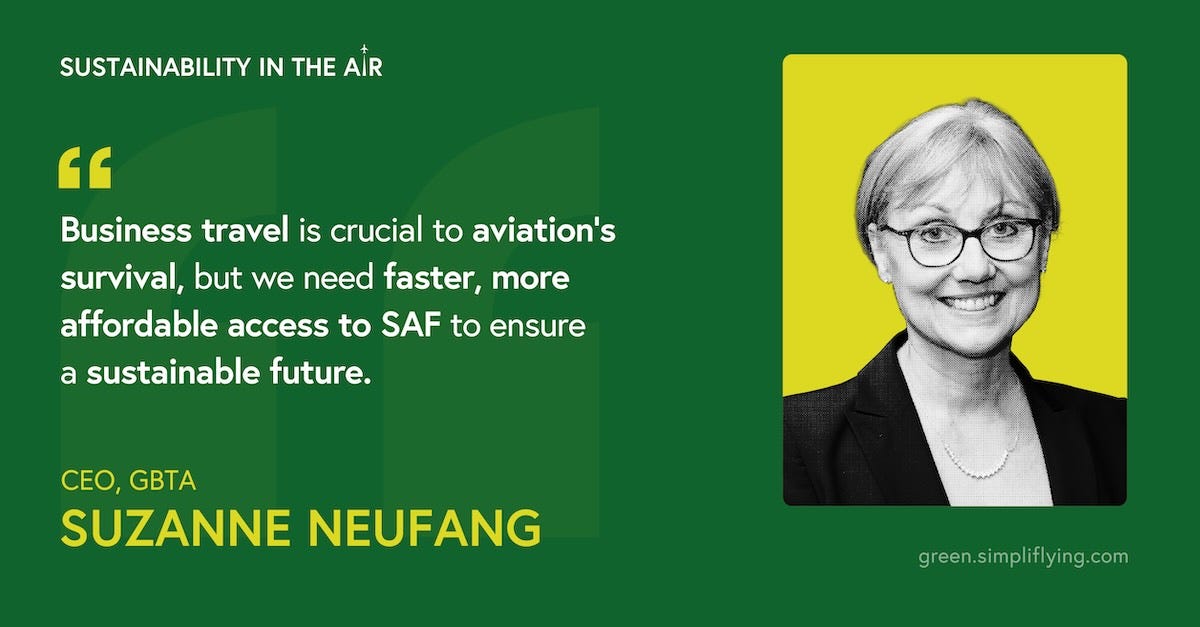In this episode of ‘Sustainability in the Air’, Suzanne Neufang, CEO of the Global Business Travel Association (GBTA), speaks with SimpliFlying’s CEO Shashank Nigam about how the world’s leading business travel association is transforming corporate travel programmes to accelerate aviation decarbonisation through industry collaboration and standardisation.
GBTA is the only global body representing both buyers and suppliers in business travel—an ecosystem responsible for $1.5 trillion in annual spending. This dual perspective puts the association at the centre of industry efforts to rethink how travel is sourced, managed, and decarbonised.
Its long-standing presence—spanning more than five decades and regions from North America to APAC—adds weight to its mission: embedding sustainability into corporate travel in ways that influence aviation more broadly.
“If we can make the 1.5 trillion in spend of business travel be more sustainable, it will help the entire travel industry be more sustainable,” says Neufang.
Here are the key highlights of the conversation:
What GBTA does and its global reach (2:44)
GBTA’s three-pronged sustainability strategy and Foundation work (7:50)
The GBTA Sustainability Acceleration Challenge (12:48)
SAF as the most promising aviation decarbonisation pathway (22:25)
AI’s potential for optimising routes and cutting 10-15% of emissions (29:57)
Rapid Fire! (38:41)
Keep reading for a detailed overview of the episode.
Why business travel sustainability matters for aviation's future
Business travel represents a disproportionately significant portion of aviation’s environmental impact. Corporate travellers who fly frequently are responsible for generating substantially higher emissions per passenger than leisure travellers, and also the most airline profits. This makes business travel both a critical challenge and an essential catalyst for aviation sustainability.
The influence of corporate travel buyers extends far beyond their direct emissions. Their procurement decisions drive demand signals that can accelerate sustainable aviation fuel (SAF) adoption, influence aircraft technology development, and establish sustainability standards throughout the aviation value chain.
When companies with substantial travel budgets prioritise sustainability, airlines and other suppliers respond with innovative solutions and enhanced environmental performance.
Moreover, business travel serves as an ideal testing ground for new sustainability technologies and practices. Corporate travel programmes typically feature more structured booking processes, detailed reporting capabilities, and professional travel management oversight—creating conditions where sustainability innovations can be effectively implemented, measured, and refined before broader market adoption.
4 takeaways from the conversation
1. Taking a pragmatic approach to industry transformation
GBTA has adopted what Neufang describes as a pragmatic approach to aviation sustainability transformation. This approach recognises that sustainability progress requires bringing together diverse stakeholders with varying priorities, timelines, and definitions of success. GBTA’s role involves “rallying key players around common standards” across the complex corporate travel ecosystem, which includes travel buyers, airlines, hotels, car rental companies, travel management companies, and technology providers.
The association’s three-pronged approach demonstrates this pragmatism in action:
GBTA brings the industry together across the full corporate travel value chain to foster collaboration and jointly tackle industry challenges.
It also focuses on rallying key players around common standards, leveraging associations’ unique ability to establish industry-wide frameworks, and to push the business travel towards practices that help in decarbonising aviation.
GBTA builds capacity at scale through its global members, providing research and education that helps organisations start, advance, or accelerate sustainable practices.
The GBTA acknowledges that complex sustainability challenges cannot be solved by individual companies or sectors working in isolation. Instead, it requires coordinated action that balances immediate business pressures—such as cost containment, duty of care, and return on investment—with longer-term sustainability objectives.
2. Measuring progress through comprehensive benchmarking
The GBTA Sustainability Acceleration Challenge is an industry-first global benchmarking initiative to evaluate the current state of business travel programmes and the actions being taken by organisations to decarbonise them.
Launched in November 2024 by the GBTA Foundation (the charitable arm of GBTA), the programme mobilised over 240 companies representing a cumulative annual business travel spend of more than $14 billion in its inaugural year.
“The companies had to complete a maturity assessment that evaluated their organisation’s performance,” Neufang explains, noting that the evaluation covered 15 action levers related to decarbonising business travel programmes. The results provided both encouraging signs of progress and sobering evidence of the work ahead.
The challenge employs a 0-5 ranking system, with 0 denoting “no activity” and 5 denoting “leading practice” action to mitigate business travel emissions. In 2024, the baseline year for the challenge, the overall industry average was 1.3, demonstrating that “some action is being taken and planned” but “there is a long way to go and an urgent need to turn commitments into real practice.”
However, the data also identified significant positive trends. 79% of participating companies reported evaluating trip necessity, ensuring employees consider whether travel is purposeful before booking. Additionally, 62% are already tracking business travel emissions, with another 14% planning to implement tracking systems.
By providing benchmarking data and highlighting best practices from leading companies, GBTA enables organisations to understand their relative performance and identify actionable improvement opportunities.
3. Leveraging AI for smarter travel decisions
Neufang believes artificial intelligence has strong potential to transform how companies manage travel programs and reduce emissions, offering both immediate improvements and long-term strategic benefits, while also recognising the need to quickly address the risks AI presents.
“AI holds great potential for companies to improve their travel programmes overall, and specifically to address travel-related emissions,” says Neufang. These opportunities include deeper data analysis, predictive modelling for emission reduction pathways, and support for better travel decisions through real-time sustainability information.
The most immediate applications involve integrating carbon emissions data for air, hotel, car, and rail travel into booking platforms, making sustainability information available at the point of purchase. This could enable travellers to make informed choices whilst supporting corporate sustainability objectives without requiring complex separate systems or processes.
AI also offers potential for broader system optimisation. “Within aviation specifically, AI can help optimise routes—potentially cutting 10-15% of emissions immediately by enabling more efficient flight paths,” Neufang notes. “I think that’s a low-hanging fruit we should take advantage of right away.”
However, significant implementation challenges persist within the corporate travel ecosystem. Unlike consumer travel, corporate travel involves multiple intermediaries—such as booking tools, travel management companies, and policy frameworks—that shape employee choices. Integrating AI-powered sustainability features requires coordination across these stakeholders and systems.
AI’s potential lies in its ability to consolidate best practices and align decision-making across organisations and travel scenarios, potentially accelerating the industry-wide shift toward sustainable travel.
4. Scaling SAF through corporate demand
SAF is “the most promising decarbonisation pathway for aviation,” says Neufang, yet GBTA finds that only 12% of companies currently purchase SAF certificates (SAFc) to address their carbon emissions from travel.
“Corporate customers realise that they have an important role to play by stimulating the market and sending a clear demand signal [for SAF use],” Neufang explains. SAF certificates enable this market stimulation by allowing companies to support SAF production without requiring their specific flights to use SAF directly.
Companies currently purchasing SAF certificates spend an average of $400,000 annually, with participation set to double as another 15% of companies plan to enter the market, shares Neufang. These demand signals provide crucial revenue streams for SAF producers and help establish the commercial viability necessary for large-scale production capacity.
GBTA is also set to launch a SAF Corporate Connect group in 2025 to facilitate knowledge sharing between travel buyers and SAF experts, helping companies build business cases and assess SAF procurement options.
Get our new book
Our new book Sustainability in the Air: Volume Two is now available for purchase on Amazon. Learn more about the startups, strategists, and sceptics working to close the gap between growth and green ambition.
‘Sustainability in the Air’ is the world’s leading podcast dedicated to sustainable aviation. Through in-depth conversations with top aviation leaders, we break through the clutter and provide a clear roadmap for a net-zero future.













